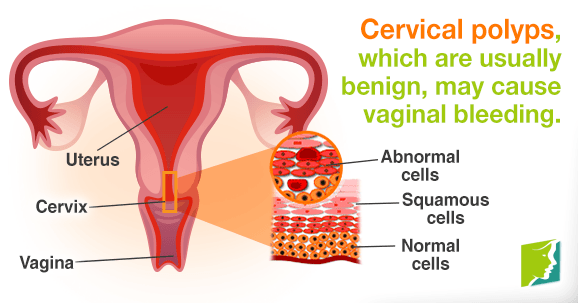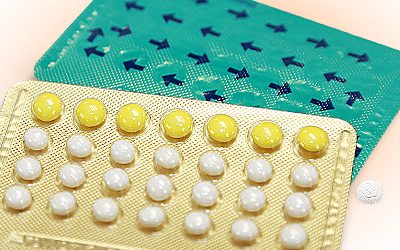Vaginal bleeding after menopause is usually caused by atrophic vaginitis, a condition where the vaginal and uterine walls thin and are not sufficiently lubricated because of low levels of estrogen in the body. This condition can make it painful or difficult for a woman to have sexual intercourse, but it can be treated and prevented.
Why Am I Experiencing Vaginal Bleeding?
Along with atrophic vaginitis discussed above, there can be different reasons women experience vaginal bleeding during postmenopause. Vaginal bleeding is a symptom of another condition rather than a disorder itself. Some of the causes of vaginal bleeding can be serious, so if you are experiencing vaginal bleeding after menopause, it is important to see your doctor as soon as possible. Vaginal bleeding can be caused by the following:
Polyps
Polyps are small growths on the cervix that can cause vaginal bleeding. Polyps are usually benign, but should be checked by a doctor. If needed, vaginal polyps can be surgically removed to prevent postmenopausal vaginal bleeding.
Infections
Infections like chlamydia and cystitis can cause vaginal bleeding. Women should see their physician if they have pain during urination or abnormal vaginal discharge. Infections that cause vaginal bleeding can often be treated with prescription medication.
Thickened uterine lining
This is frequently caused by hormone replacement therapy (HRT), high levels of estrogen in the body, and being overweight. If this goes untreated, endometrial cancer can develop. Around 1 in 10 women with postmenopausal bleeding will have endometrial cancer, a type of cancer that starts in the uterus.
The biggest cause of vaginal bleeding after postmenopause is vaginal dryness, which is brought on by low estrogen levels. There are many ways to help vaginal dryness. The easiest way is to use water-based lubricants or natural oils to make sex more comfortable and pleasurable.
How Can I Treat Vaginal Bleeding After Menopause?
If a woman's vaginal bleeding is caused by vaginal dryness, there are topical creams, natural remedies, and in some cases low levels of hormone replacement therapy that can help. It is also recommended to use a water-based lubricant before sex.
It is important to talk with your doctor if you feel like the cause of your vaginal bleeding is something more serious than vaginal dryness. Your doctor should talk with you about your symptoms and experiences. He or she may also perform a vaginal ultrasound, a pelvic examination, perform tests on a sample of your uterus, or do a camera examination called a hysteroscopy.
Postmenopausal bleeding is usually not due to a serious condition, and there are treatments avaliable for the different causes of postmenopausal bleeding.
Sources
- National Health Service UK. (2014). Postmenopausal bleeding. Retrieved August 4, 2015, from http://www.nhs.uk/Conditions/postmenopausal-bleeding-or-spotting/Pages/Introduction.aspx




